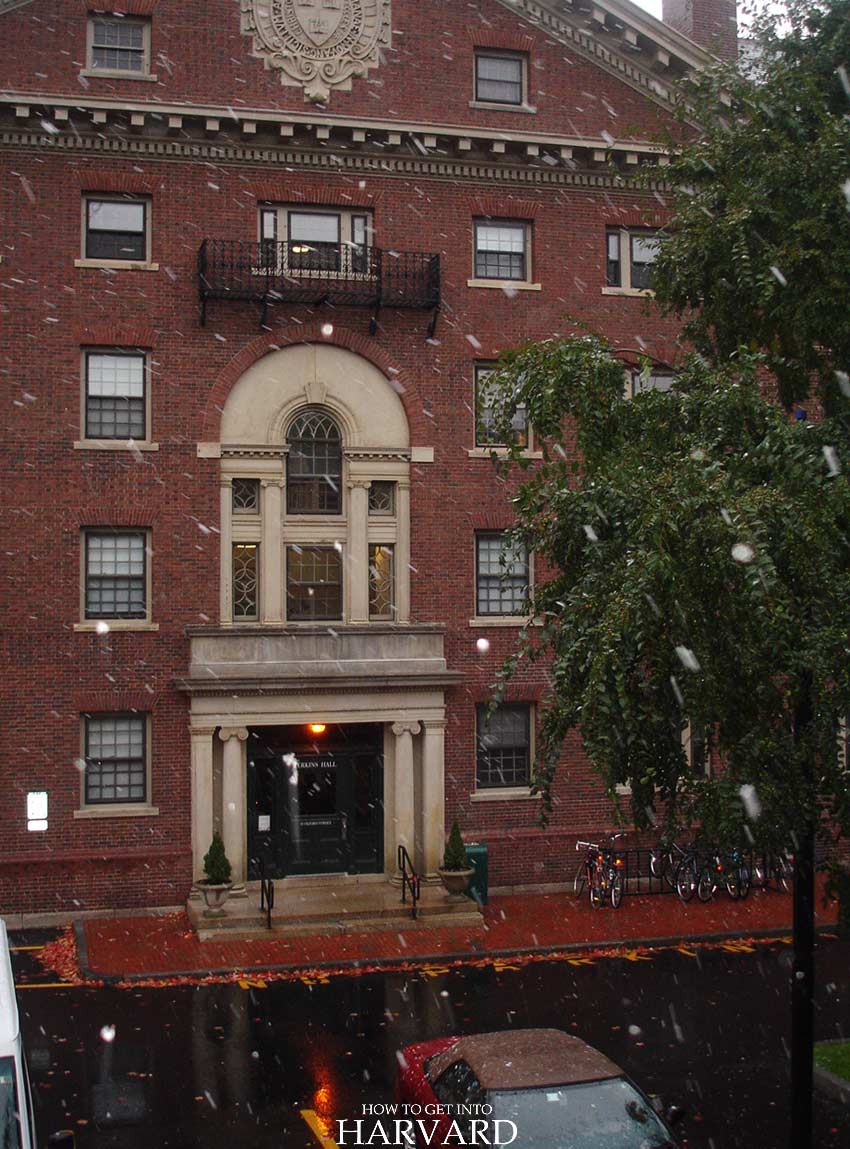Whether you are a prospective student aspiring to join the ranks of Harvard’s elite or a current student seeking guidance on how to make the most of your Harvard experience, this survival guide is here to support you every step of the way.

With its rich history, unparalleled academic rigor, successful alumni, and a student body as bright as the professors themselves, Harvard University is easily one of the most iconic institutions in the world. And now you gear up to attend THE university and hope to live up to the real-world success of other famous Harvard alumni. Enough to make anyone feel daunted, right?
Overwhelming – the word whose meaning I actually relearned during my first week at Harvard. As a Harvard alumna myself, graduating from the Harvard Graduate School of Design (GSD) with a Master’s degree in Design in 2011, I understand both the challenges and incredible opportunities that accompany the privilege of being a Harvard student.
So if you plan to attend in the fall, and are as overwhelmed as I once was, I’m gonna try to ease your mind a bit. That’s why I’ve created a comprehensive survival guide for you, equipping you with the knowledge and tools to thrive during your time at this esteemed institution.
Harvard Student Survival Guide
Harvard University presents a unique environment, particularly because of how many opportunities there are. Being around smart people all the time was the best experience of my life. It’s so mentally stimulating. The environment pushes students to explore their intellectual boundaries, engage in critical thinking, and cultivate a lifelong love for learning. You want to take all the classes, pursue all the activities and join almost all the student clubs! I miss it all!

However, the journey through Harvard is not without its hurdles. The demanding academic workload, fierce competition, and high expectations can sometimes feel overwhelming. Yet, within these challenges, the potential for personal growth and transformation lies.
So here’s some practical advice, insights, and strategies to navigate the complexities of Harvard life. Academic preparation, time management, building a support network, exploring opportunities, maintaining well-being, managing finances, and leveraging the abundant resources Harvard has to offer – there’s a lot of ground to cover.
So let’s go!
1. Preparing for Harvard
Before arriving on campus, here are the crucial steps to ensure a smooth transition and successful journey at Harvard:
Choosing the right courses & building a foundation:
- First things first, don’t feel intimidated by the long reading lists your professors email you before the academic year even begins. They’re only optional.
- However, if your major is something new to you, familiarize yourself with the course material a bit, and check out the scholarly materials they recommend.
- Explore all the courses offered at your school beforehand, especially the ones that have lottery enrolment, as those have early application deadlines. Also learn about the classes offered at other schools across Harvard and MIT, as you can cross-register.
- Consider your passions, interests, and long-term career goals when selecting your courses and major. Seek advice from academic advisors, professors, and current students to gain insights.

Understanding the academic expectations and workload:
- The students rightly call it var-Hard, ‘cuz it’s so very hard! Go in expecting Harvard’s academic rigor and high expectations, so you don’t find it surprising when you’re overloaded with work.
- It’s also a good idea to learn about the grading system, required courses for your major, and academic policies.
- Develop effective study habits, time management skills, and strategies to handle the workload. Most importantly, if English is not your first language, it’s important to get a lot of speaking and listening practice.
- Remember, it’s not just about the grades or the prestige but about the cultural quotient and personal growth you’ll gain along the way. So, just embrace the journey and explore your personal and academic interests.

2. Financial Considerations
Being a student, especially an international student requires careful planning and understanding of available options. Cambridge is one of the more expensive places to live in, and Harvard ain’t cheap either. So here’s how to manage your finances effectively:
Exploring part-time job opportunities:
- Look for on-campus job opportunities for additional income.
- Although some part-time positions can provide valuable work experience and networking opportunities, be sure to take up a job that isn’t stressful. There’ll already be plenty of that in your academic life. So just go for something that is flexible and easy for you.
Managing expenses and understanding financial aid:
- If you’re on a budget, make a list to track your income and expenses, especially in the early days when you’re still getting used to the new place and lifestyle.
- Consider cost-saving measures such as sharing housing with roommates, using public transportation, and utilizing student discounts.
- Explore scholarship and grant opportunities offered by the university, external organizations, and government programs.
- Stay informed about the financial aid application process and deadlines. In many schools, aid is offered only upon request. So ensure you submit all required documentation timely.
Remember, financial planning is an ongoing process. Regularly reassess your budget, explore opportunities for additional income, so that your time at Harvard is without undue financial stress.
3. Moving In
Moving into your new home on campus is an exciting milestone in your Harvard journey. Here are some tips to make the process smooth and enjoyable:
Packing planning:
- Make a checklist of essential items you’ll need, such as bedding, kitchen things, and study supplies, etc. This will depend on where you’re planning on staying. For example, no need for a vacuum cleaner or furniture if you’re living in the dorm.
- Also add items to your immediate shopping list (toiletries and groceries) and “later” shopping list (fan, comforter, mini-fridge (yes!) and winter clothing).
- Pack strategically, keeping in mind the limited space available in your dorm or residence. The closet space is limited too, and most gets taken up by winter clothing and kitchen items (yes, you need to store most of it in your room).
- Coordinate with your roommates to avoid unnecessary duplication of items.
I’ve created a whole moving-in checklist and many other moving in tips in my article: New Harvard Students Guide
Understanding housing options:
- Familiarize yourself with the different housing options available, such as dormitories, residential houses, or off-campus apartments.
- There are both Harvard-owned and independent apartments to choose from. Harvard-owned ones are, of course, more expensive, but are closer to campus and offer better security, networking opportunities, and amenities.
Familiarize yourself with campus policies:
- Review the guidelines and regulations provided by Harvard regarding move-in procedures, deadlines, parking, and any specific requirements.
- Understand any restrictions on items like appliances, furniture, or pets to ensure compliance.

Seek support from campus resources:
- Take advantage of the assistance offered by resident advisors or move-in volunteers who can provide guidance and answer questions.
- Harvard also has a Host Program that can connect you to a local Bostonian, who can help you with moving. For example, my lovely host helped me pick out appropriate winter clothing, moving in supplies and even picked me up at the airport and dropped me at my dorm.
- Utilize campus services such as moving carts or storage options to ease the process.
Settling in:
- Connect with your roommates or neighbors, fostering a sense of community and support. My dormmates were such a great help during my times of distress, moving out and especially whenever I got sick or injured. They made everything fun!
- If you’re an international student, you’ll need to set up many things during your first few days, like a new phone plan, a bank account and if you’re gonna be working, a social security number. So best plan moving in a few days before term starts and take help from the international students office.
- Your dorm room or home will be your oasis when the times get harder, especially during exams and interviews. So personalize your living space to create a comfortable and inspiring environment. And don’t forget to keep some snacks.
4. Navigating Campus Life
Campus life is the most exciting thing, especially if you’re going back to school after a job. Here’s how to immerse yourself in the vibrant world of Harvard:
Exploring the Harvard campus:
- Take a basic map on a sunny day to explore the campus, from iconic landmarks to hidden gems. But don’t forget an umbrella (it can rain anytime!), or at least, check the weather forecast before going out.
- Locate important buildings such as classrooms, student lounge, academic departments, libraries, and student support services.
- Find your way around dining halls, recreational facilities, and study spots that suit your preferences.
- Most importantly, know your go-to cafe, grocery store, bus stop and T-stop. Don’t even get me started on ice-cream while it’s still summer! You’ll soon be running around from class to class and won’t have much time to explore!
Also read: Harvard University Schools: An Aspirant’s Guide to Harvard

Exploring extracurricular activities and organizations:
- Explore all the extracurricular activities, and student organizations on campus, and pursue your passions, whether it’s joining a cultural club, participating in a sports team, or engaging in community service.
- Take advantage of leadership opportunities within student clubs (great for your resume), building valuable skills and connections.
- As you navigate campus life, don’t be afraid to step out of your comfort zone, try new things.
Mastering Time Management
Finding the right balance between academics and extracurriculars is crucial for a fulfilling experience at Harvard. Here are some tips:
Balancing Act:
- Prioritize your commitments and learn to say no to invites that don’t feel essential.
- Find a healthy equilibrium between academic responsibilities and personal interests.
Study Smarter, Not Harder:
- Develop effective study habits, such as active reading, note-taking, and regular review.
- Create a study schedule that works for you, considering your peak productivity hours.
- Take advantage of resources like libraries, study groups, and academic support services to enhance your learning experience.
Building a Support Network
Here’s how to build connections and establish a strong support network that is invaluable during your time at Harvard and beyond:
Cultivate meaningful relationships:
- Harvard is one of those special places where you can actually connect with individuals from all different backgrounds. So go out of your way to learn more about the world and it’ll help you in unexpected ways later on in life. For example, my friends from all over the world are my guide when I travel, give me valuable insight into international business, and besides it’s so cool to have them in my life!
- Remember, campus life at Harvard is about more than just academics or networking. It’s an opportunity to actually form meaningful friendships, and broaden your horizons.
- Your friends and Harvard network will be your support system throughout your Harvard career and beyond. As I’m looking for funding for my company, you won’t believe how my friends, professors and even alumni from Harvard are coming forward to provide their feedback and connections. So make sure you focus on creating genuine connections, and not just acquaintances for the sake of it.

Classmates, Faculty, Alumni:
- Actively engage with your classmates by participating in discussions and group projects.
- Seek guidance from professors and teaching assistants, and attend office hours to build rapport.
- Connect with staff members who can provide valuable insights and support throughout your journey.
- Leverage Harvard’s extensive alumni network for mentorship, advice, and career opportunities. You can do this by attending alumni events, and joining alumni groups.
Exploring Opportunities
Harvard offers a multitude of opportunities to explore and expand your horizons. Here’s how you can make the most of your time at Harvard:
Research, Internships, and Study Abroad:
- Seek out research opportunities on campus. If there’s a particular area of interest, reach out to faculty members in that area and ask them if they have any RA positions or projects they need help on. Often it’s paid work too.
- Consider Traveling Fellowships or study abroad programs. Or take up classes that have international travel opportunities to immerse yourself in different cultures and broaden your perspective.
- Start applying for an internship as early as the end of your first semester. Otherwise, all good spots will be taken before the Spring break. Make sure to look for internships that align with your interests, career goals.
Career Services and Networking Events:
- Engage with Harvard’s career services to access resources, workshops, and job/internship postings. They helped me master the art of resume-making.
- Attend networking events, career fairs, and industry-specific panels to connect with professionals in your field. If you’re an introvert, these will be great to practice your conversation skills.
Pursue Personal Interests:
- Don’t always listen to your academic advisor and follow your passions (don’t tell them I said that). For example, my AA didn’t want me taking up my fiction writing class or my animation class (my masters was in Real Estate). But look how it helped me build my writing and graphic design skills which gave me the confidence to start my company, SAM.
- Take advantage of Harvard’s vast array of resources, clubs, and organizations to explore your passions.
- Attend workshops, and events related to your hobbies.
- Start your own clubs or get the advice of anyone you can find on campus!
Taking Care of Your Well-being
Your well-being is paramount to your success at Harvard. Here’s how you can prioritize self-care and manage stress effectively:
Stress Management:
- Recognize the signs of stress. Implement healthy coping strategies, such as exercise, mindfulness, or getting support.
- Prioritize self-care activities. Get enough sleep, try to cook a healthy meal every weekend or more (yes), and do what you love (by which I mean exercise).
Mental Health Resources and Support:
- Reach out for help if you’re experiencing difficulties or need someone to talk to.
Work-Life Balance:
- Strive for a healthy study-life balance by allocating time for personal activities, and go out for those drinks!
- Taking breaks and allowing yourself downtime is okay. Sleeping is okay. Texting your professor that you need a health day is okay (they may not understand, and that’s okay too).
Making the Most of Harvard’s Resources:
Harvard offers a wealth of resources to support your academic and personal growth. Here’s how you can make the most of them:
Libraries, Research Facilities, and Technology:
- Find your favorite librar and study spots.
- Use all those online databases, and why not find a part-time job that lets you use an iPad, an iMac and a Lynda account! That’s how I learned to make a website!
Academic Support Services:
- Find a study buddy or study group if you need one.
- Seek guidance from faculty or teaching assistants when you encounter challenges in your coursework.
Engaging with Professors:
- Attend office hours to build relationships with professors and discuss class topics or your academic interests.
- Ask questions, and show genuine interest in the subject matter.
So, as you embark on this transformative journey, I hope you leave your indelible mark on the legacy of Harvard University. Because you totally can!
Best of luck!
Read next: Experience the Harvard Student Life with Me: How is Life at Harvard